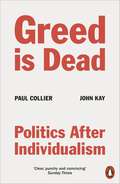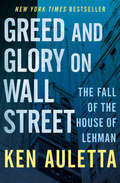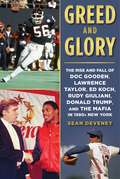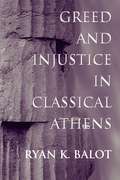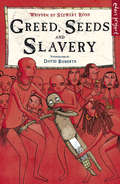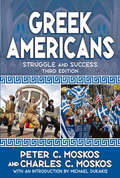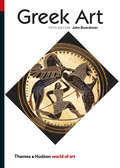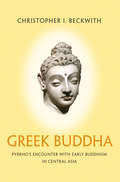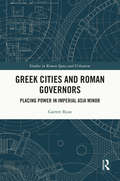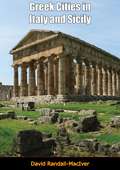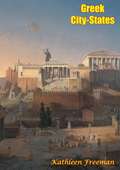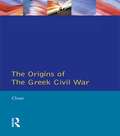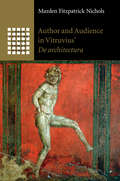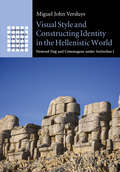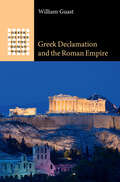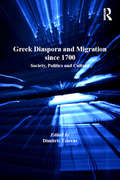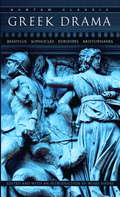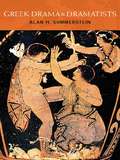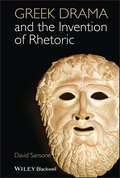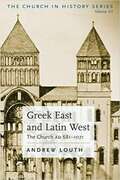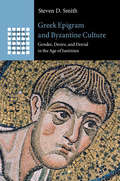- Table View
- List View
Greed Is Dead: Politics After Individualism
by Paul Collier John KayTwo of the UK's leading economists call for an end to extreme individualism as the engine of prosperity 'provocative but thought-provoking and nuanced' TelegraphThroughout history, successful societies have created institutions which channel both competition and co-operation to achieve complex goals of general benefit. These institutions make the difference between societies that thrive and those paralyzed by discord, the difference between prosperous and poor economies. Such societies are pluralist but their pluralism is disciplined.Successful societies are also rare and fragile. We could not have built modernity without the exceptional competitive and co-operative instincts of humans, but in recent decades the balance between these instincts has become dangerously skewed: mutuality has been undermined by an extreme individualism which has weakened co-operation and polarized our politics.Collier and Kay show how a reaffirmation of the values of mutuality could refresh and restore politics, business and the environments in which people live. Politics could reverse the moves to extremism and tribalism; businesses could replace the greed that has degraded corporate culture; the communities and decaying places that are home to many could overcome despondency and again be prosperous and purposeful. As the world emerges from an unprecedented crisis we have the chance to examine society afresh and build a politics beyond individualism.
Greed and Glory on Wall Street: The Fall of the House of Lehman
by Ken AulettaThe inside account of a financial meltdown that reshaped Wall Street In 1983, Lew Glucksman, then co-CEO of the heralded investment bank Lehman Brothers, demanded the resignation of chairman Pete Peterson, with whom he had long argued over how to manage the company. Shockingly, Peterson, who had taken charge a decade earlier and led Lehman from near collapse to record profits, agreed to step down. In this meticulously researched volume, Ken Auletta details the turmoil, infighting, and power struggles that brought about Peterson's departure and the eventual sale of one of Wall Street's oldest and most prestigious firms. Set against the backdrop of the 1980s stock exchange, where hotshot young traders made and lost millions in a single afternoon, the story of Lehman's fall is a suspenseful battle of wills between bankers, traders, and executives motivated by greed, envy, and ego. Auletta, who conducted hundreds of hours of interviews and was granted access to private company records, has crafted a thorough, enduring, and engaging account of pivotal events that continued to influence this storied financial institution until its ultimate demise in 2008.
Greed and Glory: The Rise and Fall of Doc Gooden, Lawrence Taylor, Ed Koch, Rudy Giuliani, Donald Trump, and the Mafia in 1980s New York
by Sean DeveneyOn October 28, 1986, just one day after winning one of the most thrilling World Series in history, the New York Mets were feted by more than two million fans with a parade through the city. In news accounts of the event, there was a small aside, as this one in the New York Times: "Notable in his absence was the pitcher Dwight Gooden, who Mets officials later said had overslept." No, the Mets' twenty-one-year-old phenom had not slept too late. He had not slept at all, in fact. For Gooden, his postgame champagne celebration kicked off a cocaine binge that took him to a club in Long Island and wound up with him, wired, watching his teammates roll through the streets as he sat with strangers in a public housing project. Such were the 1980s in New York City, a gilded era buttressed by fast money from a real estate boom and the explosion of Wall Street wealth. The Mets and Giants, bolstered by lightning-rod personalities like Gooden and Lawrence Taylor, brought the city sporting glory while its celebrity wealthy added a tabloid-friendly touch of intrigue and national envy. Iconoclastic real estate developer Donald Trump gained national celebrity for his deal-making skill and the flaunting of his outsize ego. Even mayor Ed Koch had gained coast-to-coast fame and mention as a potential future president.Beneath the opulence was a tenuous foundation, one that collapsed spectacularly over the last half of the decade. Away from the cameras focused on the city's nouvelle riches, New York was beset by crisis after crisis--homelessness, AIDS, crack cocaine, organized crime. The swell of outrage over the unwillingness of the city elite to address those problems took years to finally reach a tipping point. Through interviews and detailed research, Greed and Glory gives the narrative of New York during these times, tracing the arc of its sports heroes and celebrities of that era, from their memorable highs to their ultimate lows.
Greed and Injustice in Classical Athens
by Ryan K. BalotIn this original and rewarding combination of intellectual and political history, Ryan Balot offers a thorough historical and sociological interpretation of classical Athens centered on the notion of greed. Integrating ancient philosophy, poetry, and history, and drawing on modern political thought, the author demonstrates that the Athenian discourse on greed was an essential component of Greek social development and political history. Over time, the Athenians developed sophisticated psychological and political accounts of acquisitiveness and a correspondingly rich vocabulary to describe and condemn it. Greed figures repeatedly as an object of criticism in authors as diverse as Solon, Thucydides, and Plato--all of whom addressed the social disruptions caused by it, as well as the inadequacy of lives focused on it. Because of its ethical significance, greed surfaced frequently in theoretical debates about democracy and oligarchy. Ultimately, critiques of greed--particularly the charge that it is unjust--were built into the robust accounts of justice formulated by many philosophers, including Plato and Aristotle. Such critiques of greed both reflected and were inextricably knitted into economic history and political events, including the coups of 411 and 404 B.C. Balot contrasts ancient Greek thought on distributive justice with later Western traditions, with implications for political and economic history well beyond the classical period. Because the belief that greed is good holds a dominant position in modern justifications of capitalism, this study provides a deep historical context within which such justifications can be reexamined and, perhaps, found wanting.
Greed, Seeds and Slavery
by Stewart RossCommemorating the 200th anniversary of the abolition of the Slave Trade Act, this collection of eleven stories follows the lives of slaves of every kind around the world. Join African Queen Jinga as she unites the tribes of Ndongo against the invading Portuguese. Watch John Blanke as he becomes the first black trumpeter to play for the King Henry VIII. Meet Harriet Tubman as she helps escaped slaves flee along the Underground Railroad to freedom.Moving, exciting and often funny, these true stories span centuries and the globe, feature famous historical figures such as William Wilberforce and Catherine of Aragon and remind us all of the true horrors of slavery in all its forms.
Greek Americans: Struggle and Success
by Peter C. MoskosThis is an engrossing account of Greek Americans their history, strengths, conflicts, aspirations, and contributions. Blending sociological insight with historical detail, Peter C. and Charles C. Moskos trace the Greek-American experience from the wave of mass immigration in the early 1900s to today. This is the story of immigrants, most of whom worked hard to secure middle-class status. It is also the story of their children and grandchildren, many of whom maintain an attachment to Greek ethnic identity even as they have become one of America's most successful ethnic groups.As the authors rightly note, the true measure of Greek-Americans is the immigrants themselves who came to America without knowing the language and without education. They raised solid families in the new country and shouldered responsibilities for those in the old. They laid the basis for an enduring Greek-American community.Included in this completely revised edition is an introduction by Michael Dukakis and chapters relating to the early struggles of Greeks in America, the Greek Orthodox Church, success in America, and the survival and expansion of Greek identity despite intermarriage. This work will be of value to scholars of ethnic studies, those interested in Greek culture and communities, and sociologists and historians.
Greek Art (Fifth) (World of Art)
by John Boardman“One of the very best short histories of Greek Art.” — The Financial Times John Boardman, one of the best known and acknowledged scholars of the classical Greek world, has updated his definitive survey of its arts, the most influential and widely known historic artistic tradition of the Old World. In the twenty years since the last edition was released, valuable evidence has come to light which has dramatically enhanced our understanding of the arts of ancient Greece and their influence. It is now known that Greek artists completed their stone sculptures with realistic color, as well as working with a wealth of other materials. This proves that the romantic notion of an age of classic, pure white marble is a Renaissance construction which has persisted to the present day. The work of individual artists, as well as schools of artists, can be identified, creating a clearer picture than ever before of how art and artistic traditions traveled throughout the Greek world and beyond it. Boardman encourages the reader to consider the masterpieces that have been preserved in their original context. He weaves into his discussion of the arts insights into the society that produced them. Illustrated in full color throughout for the first time, this fifth edition demonstrates yet more vividly the artistic aims and achievements of ancient Greece.
Greek Art And Archaeology
by Richard T. NeerThis is the text that sets a new standard in its field with striking visuals, fascinating reconstructions, accessible prose, and coverage of the wider Greek world. The Second Edition extends student understanding of Greek art in history through richer archaeological context and expanded coverage of both the earliest Bronze Age and latest Hellenistic periods.
Greek Buddha
by Christopher I. BeckwithPyrrho of Elis accompanied Alexander the Great to Central Asia and India during the Graeco-Macedonian invasion and conquest of the Persian Empire in 334-324 BC, and while there met with teachers of Early Buddhism. Greek Buddha shows how Buddhism shaped the philosophy of Pyrrho, the famous founder of Pyrrhonian scepticism in ancient Greece. Identifying Pyrrho's basic teachings with those of Early Buddhism, Christopher I. Beckwith traces the origins of a major tradition in Greek philosophy to Gandhāra, a country in Central Asia and northwestern India.Using a range of primary sources, he systematically looks at the teachings and practices of Pyrrho and of Early Buddhism, including those preserved in testimonies by and about Pyrrho, in the report on Indian philosophy two decades later by the Seleucid ambassador Megasthenes, in the first-person edicts by the Indian king Devānāṃpriya Priyadarśi referring to a popular variety of the Dharma in the early third century BC, and in Taoist echoes of Gautama's Dharma in Warring States China. Beckwith demonstrates how the teachings of Pyrrho agree closely with those of the Buddha śākyamuni, "the Scythian Sage." In the process, he identifies eight distinct attested philosophical schools in ancient northwestern India and Central Asia, including Early Zoroastrianism, Early Brahmanism, and several forms of Early Buddhism. Beckwith then shows the influence that Pyrrho's brand of scepticism had on the evolution of Western thought, first in Antiquity, and later, during the Enlightenment, on the great philosopher and self-proclaimed Pyrrhonian, David Hume.Greek Buddha demonstrates that through Pyrrho, Early Buddhist thought had a significant impact on Western philosophy.
Greek Cities and Roman Governors: Placing Power in Imperial Asia Minor (Studies in Roman Space and Urbanism)
by Garrett RyanThis volume uses the travels of Roman governors to explore how authority was defined in and by the public places of Greek cities. By demonstrating that the places where imperial officials and local notables met were integral to the strategies by which they communicated with one another, Greek Cities and Roman Governors sheds new light on the significance of civic space in the Roman provinces. It also presents a fresh perspective on the monumental cityscapes of Roman Asia Minor, epicenter of the greatest building boom in classical history. Though of special interest to scholars and students of Roman Asia Minor, Greek Cities and Roman Governors offers broad insights into Roman imperialism and the ancient city.
Greek Cities in Italy and Sicily
by David Randall-MaciverFirst published in 1931, this book by archaeologist David Randall-MacIver provides a detailed description of Greek architectural sites in southern Italy and Sicily, together with narratives on the cities where the sites are found, including their mythologies and most famous citizens, visitors and political figures.“MY IDEA in writing this book has been to supply a need which others must have felt besides myself. The scholarly visitor to Lower Italy and Sicily has up till now been obliged to take his choice between travelling with a large, though always inadequate, library and travelling with nothing more than a Baedeker. There existed no single volume in which he could find all those details of topography and local archaeology which are the first interest of any man who retains a love for classical literature and a feeling for the romance of Greek history.”—Preface
Greek City-States
by Kathleen FreemanA renowned scholarly text on ancient Greek history authored by the Welsh University scholar and lecturer Kathleen Freeman, this book deals with 9 of the hundreds of great and small Greek city-states (polis in Greek word, from which the word "politics" is derived) which occupied sites from the western Mediterranean to the coast of the Levant, from the Black Sea to North Africa at a time when Greek civilization was at its zenith.As Freeman explains in her Preface, "[i]f the Greek world is really to be understood we must know not only about Athens and Sparta, but about the islands of the Aegean Sea, the Greek cities of Sicily and Italy and Asia Minor, and the other cities of mainland Greece," and she thus casts this fascinating book in the form of a series of individual city-studies.A must-read for every Ancient Greek historian, scholar and enthusiast.
Greek Civil War, The (Origins Of Modern Wars)
by David H. CloseThe Greek Civil War (1943--50) was a major conflict in its own right, developing out of the rivalry between communist and conservative partisans for control of Greece as the Axis forces retreated at the end of the Second World War. Spanning the transition from World War to Cold War, it also had major international consequences in keeping Greece (alone of all the Balkan nations) out of the Communist bloc and stopping the Soviets reaching the Mediterranean. Yet it has received less attention than it deserves from historians. In this striking and original study, David Close does justice to both the domestic context of the conflict and also to its international significance.
Greek Culture in the Roman World: Author and Audience in Vitruvius’ De architectura (Greek Culture in the Roman World)
by Nichols Marden FitzpatrickVitruvius' De architectura is the only extant classical text on architecture, and its impact on Renaissance masters including Leonardo da Vinci is well-known. But what was the text's purpose in its own time (ca. 20s BCE)? In this book, Marden Fitzpatrick Nichols reveals how Vitruvius pitched the Greek discipline of architecture to his Roman readers, most of whom were undoubtedly laymen. The inaccuracy of Vitruvius' architectural rules, when compared with surviving ancient buildings, has knocked Vitruvius off his pedestal. Nichols argues that the author never intended to provide an accurate view of contemporary buildings. Instead, Vitruvius crafted his authorial persona and remarks on architecture to appeal to elites (and would-be elites) eager to secure their positions within an expanding empire. In this major new analysis of De architectura from archaeological and literary perspectives, Vitruvius emerges as a knowing critic of a social landscape in which the house made the man.
Greek Culture in the Roman World: Greek Myths in Roman Art and Culture
by Zahra NewbyImages of episodes from Greek mythology are widespread in Roman art, appearing in sculptural groups, mosaics, paintings and reliefs. They attest to Rome's enduring fascination with Greek culture, and its desire to absorb and reframe that culture for new ends. This book provides a comprehensive account of the meanings of Greek myth across the spectrum of Roman art, including public, domestic and funerary contexts. It argues that myths, in addition to functioning as signifiers of a patron's education or paideia, played an important role as rhetorical and didactic exempla. The changing use of mythological imagery in domestic and funerary art in particular reveals an important shift in Roman values and senses of identity across the period of the first two centuries AD, and in the ways that Greek culture was turned to serve Roman values.
Greek Culture in the Roman World: Nemrud Dağ and Commagene under Antiochos I (Greek Culture in the Roman World)
by Versluys Miguel JohnLocated in the small kingdom of Commagene at the upper Euphrates, the late Hellenistic monument of Nemrud Dağ (c. 50 BC) has been undeservedly neglected by scholars. Qualified as a Greco-Persian hybrid instigated by a lunatic king, this fascinating project of bricolage has been written out of history. This volume redresses that imbalance, interpreting Nemrud Dağ as an attempt at canon building by Antiochos I in order to construct a dynastic ideology and social order, and proving the monument's importance for our understanding of a crucial transitional phase from Hellenistic to Roman. Hellenistic Commagene therefore holds a profound significance for a number of discussions, such as the functioning of the Hellenistic koine and the genesis of Roman 'art', Hellenism and Persianism in antiquity, dynastic propaganda and the power of images, Romanisation in the East, the contextualising of the Augustan cultural revolution, and the role of Greek culture in the Roman world.
Greek Culture in the Roman World: Roman Festivals in the Greek East
by Fritz GrafThis study explores the development of ancient festival culture in the Greek East of the Roman Empire, paying particular attention to the fundamental religious changes that occurred. After analysing how Greek city festivals developed in the first two Imperial centuries, it concentrates on the major Roman festivals that were adopted in the Eastern cities and traces their history up to the time of Justinian and beyond. It addresses several key questions for the religious history of later antiquity: who were the actors behind these adoptions? How did the closed religious communities, Jews and pre-Constantinian Christians, articulate their resistance? How did these festivals change when the empire converted to Christianity? Why did emperors not yield to the long-standing pressure of the Church to abolish them? And finally, how did these very popular festivals - despite their pagan tradition - influence the form of the newly developed Christian liturgy?
Greek Culture in the Roman World: The End of Greek Athletics in Late Antiquity
by Sofie RemijsenThis book presents the first comprehensive study of how and why athletic contests, a characteristic aspect of Greek culture for over a millennium, disappeared in late antiquity. In contrast to previous discussions, which focus on the ancient Olympics, the end of the most famous games is analysed here in the context of the collapse of the entire international agonistic circuit, which encompassed several hundred contests. The first part of the book describes this collapse by means of a detailed analysis of the fourth- and fifth-century history of the athletic games in each region of the Mediterranean: Greece, Asia Minor, Syria, Egypt, Italy, Gaul and northern Africa. The second half continues by explaining these developments, challenging traditional theories (especially the ban by the Christian emperor Theodosius I) and discussing in detail both the late antique socio-economic context and the late antique perceptions of athletics.
Greek Declamation and the Roman Empire (Greek Culture in the Roman World)
by William GuastA Greek declamation was an 'imaginary speech': a fictitious speech composed for a rhetorical scenario set in Classical Greece. Although such speeches began as rhetorical exercises, under the high Roman empire they developed into a full-blown prestigious genre in their own right. This first monograph on Greek declamation for nearly forty years re-evaluates a genre that was central to Greek imperial literature and to ancient and modern notions of the 'Second Sophistic'. Rejecting traditional conceptions of the genre as 'nostalgic', this book considers the significance of Greek declamation's re-enactment of classical history for its own times, and integrates the genre into the wider history of the period. It shows through extended readings how the genre came to constitute a powerful and subtle instrument of identity formation and social interaction, and a site for free thinking on issues of major contemporary importance such as imperialism and inter-polis relations.
Greek Diaspora and Migration since 1700: Society, Politics and Culture
by Dimitris TziovasThe Greek diaspora is one of the paradigmatic historical diasporas. Though some trace its origins to ancient Greek colonies, it is really a more modern phenomenon. Diaspora, exile and immigration represent three successive phases in Modern Greek history and they are useful vantage points from which to analyse changes in Greek society, politics and culture over the last three centuries. Embracing a wide range of case studies, this volume charts the role of territorial displacements as social and cultural agents from the eighteenth century to the present day and examines their impact on communities, politics, institutional attitudes and culture. By studying migratory trends the aim is to map out the transformation of Greece from a largely homogenous society with a high proportion of emigrants to a more diverse society inundated by immigrants after the end of the Cold War. The originality of this book lies in the bringing together of diaspora, exile and immigration and its focus on developments both inside and outside Greece.
Greek Drama
by Moses HadasIn power, passion, and the brilliant display of moral conflict, the drama of ancient Greece remains unsurpassed. For this volume, Professor Hadas chose nine plays which display the diversity and grandeur of tragedy, and the critical and satiric genius of comedy, in outstanding translations of the past and present. His introduction explores the religious origins, modes of productions, structure, and conventions of the Greek theater, individual prefaces illuminate each play and clarify the author's place in the continuity of Greek drama. Copyright © Libri GmbH. All rights reserved.
Greek Drama and Dramatists
by Alan H. SommersteinThe history of European drama began at the festivals of Dionysus in ancient Athens, where tragedy, satyr-drama and comedy were performed. Understanding this background is vital for students of classical, literary and theatrical subjects, and Alan H. Sommerstein's accessible study is the ideal introduction. The book begins by looking at the social and theatrical contexts and different characteristics of the three genres of ancient Greek drama. It then examines the five main dramatists whose works survive - Aeschylus, Sophocles, Euripides, Aristophanes and Menander - discussing their styles, techniques and ideas, and giving short synopses of all their extant plays. Additional helpful features include succinct coverage of almost sixty other authors, a chronology of significant people and events, and an anthology of translated texts, all of which have been previously inaccessible to students. An up-to-date study bibliography of further reading concludes the volume. Clear, concise and comprehensive, and written by an acknowledged expert in the field, Greek Drama and Dramatists will be a valuable orientation text at both sixth form and undergraduate level.
Greek Drama and the Invention of Rhetoric
by David SansoneAsserts a novel and controversial theory on the origins of rhetoric that differs radically from the standard view Argues that it was the theatre of Ancient Greece, first appearing around 500 BC, that prompted the development of formalized rhetoric, which evolved soon thereafter Provides a cogent reworking of existing evidence Reveals the bias and inconsistency of Aristotle
Greek East and Latin West: The Church AD 681-1071
by Andrew LouthThis volume gives an account of the Church in the period from the end of the Sixth Ecumenical Synod in 681 to the Battle of Manzikert in 1071. <p><p> Although 'Greek East' and 'Latin West' are becoming distinct entities during this expanse of time, the author treats them in parallel, observing the points at which their destinies coincide or conflict and noting developments within the whole of the Church rather than striving simply, or even primarily, to explain the eventual schism between Eastern and Western Christendom. <p><p> Covering events both unique to each part (the Iconoclastic controversy in the East and the rise of the Carolingian Empire in the West) and common to each part (monastic reform, renaissance, and mission) the author skillfully portrays two Christian civilizations that share much in common yet become increasingly incomprehensible to one another. <p><p> Despite curious synchronisms between East and West, the author demonstrates how two paths diverged from a once common route, and how eventually Byzantine Orthodoxy defined the Greek East over against the Latin West in theological, religious, cultural, and political terms.
Greek Epigram and Byzantine Culture: Gender, Desire, and Denial in the Age of Justinian (Greek Culture in the Roman World)
by Steven D. SmithSexy, scintillating, and sometimes scandalous, Greek epigrams from the age of the Emperor Justinian commemorate the survival of the sensual in a world transformed by Christianity. Around 567 CE, the poet and historian Agathias of Myrina published his Cycle, an anthology of epigrams by contemporary poets who wrote about what mattered to elite men in sixth-century Constantinople: harlots and dancing girls, chariot races in the hippodrome, and the luxuries of the Roman bath. But amid this banquet of worldly delights, ascetic Christianity - pervasive in early Byzantine thought - made sensual pleasure both more complicated and more compelling. In this book, Steven D. Smith explores how this miniature classical genre gave expression to lurid fantasies of domination and submission, constraint and release, and the relationship between masculine and feminine. The volume will appeal to literary scholars and historians interested in Greek poetry, Late Antiquity, Byzantine studies, early Christianity, gender, and sexuality.
